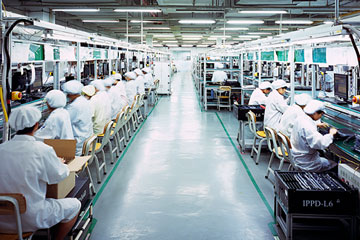
A Foxconn plant in Shenzhen, which puts together, among other products, the iPhone.
(2 of 7)
Chinese policymakers fully realize that. The new leadership team in Beijing, ushered into office a year ago, has pledged to press ahead with free-market reforms--liberalizing finance, supporting private enterprise and cracking open protected sectors. "China's modernization will not be accomplished without reform, nor will it be achieved without opening up," Premier Li Keqiang recently conceded. So far, though, progress has been slow. Few meaningful initiatives have been introduced, and even headline-grabbing measures--like the September launch of a special zone in Shanghai to experiment with freer capital flows--have proved mere baby steps. Li and his mandarins must take on vested interests and rein in an overbearing bureaucracy, which will require formidable political will. China's leadership "is not ready yet to deliver a comprehensive reform package with executable specifics and clear timetables," Bank of America Merrill Lynch economists warned in October.
Whether China succeeds or fails will determine where everything from sneakers to cars to smartphones are manufactured, the brands that appear on them and who sells them. Failure could stall China's economic miracle and dampen global growth with it. Here are five challenges China must address:
LABOR IS NO LONGER CHEAP.
In June, Chip Starnes made a fateful decision. The co-founder of Florida-based Specialty Medical Supplies, which makes alcohol pads, lancing devices and other health care products, decided to shift his plastics manufacturing from the company's Beijing factory to India. As he finalized severance packages for the 34 workers he had to lay off, the remaining 110 employees revolted. First they demanded payouts of their own and blocked efforts to pack the equipment bound for India. Then, when a rumor spread that Starnes intended to close down the entire Beijing operation, the workers held the American hostage in his office for six days.
China's workers may not like it, but what they faced at Starnes' factory will become more common. China launched its economic ascent by tossing its giant, impoverished workforce into the global supply chain. Labor was so cheap and plentiful that few other countries could match it. But with the population aging rapidly, thanks to the government's one-child policy the workforce is shrinking, and the abundance of opportunities in the fast-growing economy has made monotonous assembly-line work less appealing. As a result, wages are skyrocketing. Starnes says that over the past 10 years, the cost of a worker in his factory quintupled to $500 a month, and even with that increase, he couldn't find enough staff to fill his needs. By contrast, in Mumbai, where his new facility is based, workers are 75% cheaper and far more plentiful.
The competition for talent is so fierce in China that all sorts of employees earn well above what their counterparts in other emerging economies receive. According to data collected on median salaries by consulting firm Mercer, a machine operator earns $6,405 and a skilled secretary $11,213 in Beijing, significantly more than the $4,817 and $7,809, respectively, in India. "Companies have gone to China to find cheap labor, but it isn't there anymore," Starnes says. "Now you are forced to look elsewhere."
